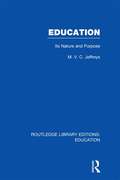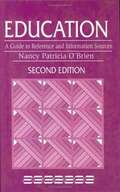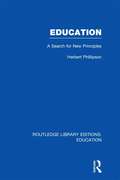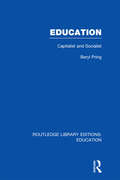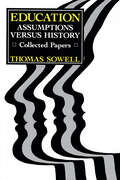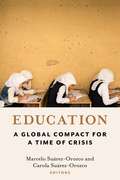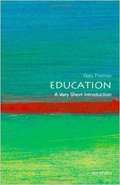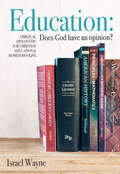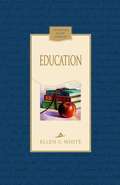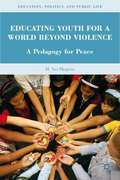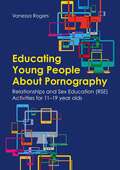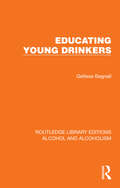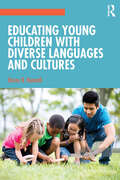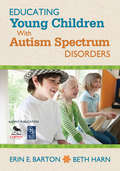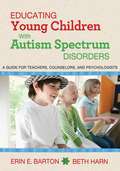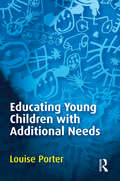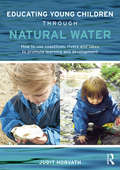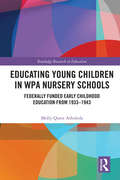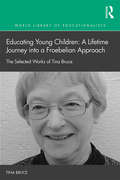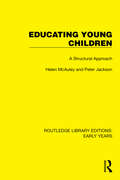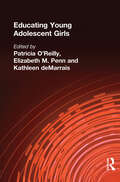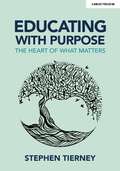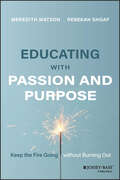- Table View
- List View
Education: Its Nature and Purpose (Routledge Library Editions: Education)
by M VC JeffreysThis book discusses the very nature and purpose of education and provides a foundation upon which more specialized studies in the psychology, history and sociology of education can be based. The book therefore surveys the main problems of human life – the relation of the individual and society, freedom and authority, continuity and change (i.e.growth), and underlying them all, the paradox that aspiration and frustration are continually linked in human experience. The educational implications of these various problems are considered in such a way that the methods as well as the aims of education are discussed.
Education: A Guide to Reference and Information Sources (2nd edition)
by Nancy Patricia O'BrienFocusing on English-language publications of the last decade, this guide identifies and describes key reference and information sources in the field of education today.
Education: A Search For New Principles (Routledge Library Editions: Education)
by Herbert PhillipsonContributing to early debates on nature versus nurture, schools and the social environment, town planning and a free comprehensive education, the author discusses key educational issues against the background of a distintegrating Europe in the midst of war.
Education: Capitalist and Socialist (Routledge Library Editions: Education)
by Beryl PringThis book argues that politics, in the sense of the government of our social structure, holds the key to the resolution of educational problems in the early twentieth century; that the teacher will only be relieved of his or her sense of frustration through government and ultimately socialist action. The author looks at the inequality of British education in the early twentieth century and the failure of capitalist education. She suggests measures to change the situation and discusses the aims and methods of socialist education.
Education: Assumptions versus History: Collected Papers
by Thomas SowellIn the papers collected in Education: Assumptions versus History, Dr. Thomas Sowell takes a hard look at the state of education in our schools and universities. His imperative is to test the assumptions underlying contemporary educational policies and innovations against the historical and contemporary evidence.
Education: A Global Compact for a Time of Crisis
by Suárez-Orozco, Marcelo; Suárez-Orozco, CarolaIn an age of catastrophes—unchecked climate change, extreme poverty, forced migrations, war, and terror, all compounded by the COVID-19 pandemic—how can schooling be reengineered and education reimagined? This book calls for a new global approach to education that responds to these overlapping crises in order to enrich and enhance the lives of children everywhere.Marcelo Suárez-Orozco and Carola Suárez-Orozco convene scholars and practitioners from a range of disciplines—including anthropology, neuroscience, demography, psychology, child development, sociology, and economics—who offer incisive essays on the global state of education. Contributors consider how educational policy and practice can foster social inclusion and improve outcomes for all children. They emphasize the centrality of education to social and environmental justice, as well as the philosophical foundations of education and its centrality to human flourishing, personal dignity, and sustainable development. Chapters examine topics such as the neuroscience of education; the uses of technology to engage children who are not reached by traditional schooling; education for climate change; the education of immigrants, refugees, and the forcibly displaced; and how to address and mitigate the effects of inequality and xenophobia in the classroom. Global and interdisciplinary, Education speaks directly to urgent contemporary challenges.Contributors include Stefania Giannini, the director of education for UNESCO; development economist Jeffrey Sachs; cognitive psychologist Howard Gardner; Carla Rinaldi, president of the Reggio Children Foundation; and academics from leading global universities. The book features a foreword by Pope Francis.
Education: A Very Short Introduction
by Gary ThomasFrom the schools of ancient times to the present day, Gary Thomas looks at how and why education evolved as it has. By exploring some of the big questions, he examines the ways in which schools work, considers the differences around the world, and concludes by considering the future of education worldwide.
Education: A Biblical Apologetic for Christian Education & Homeschooling
by Israel WayneStudents in America will spend over 14,000 seat hours in a classroom before they graduate from high school. On the other hand, most Christian children spend less than an hour a day in meaningful interaction with their parents, and only a few hours a week (at most) in church. Is it reasonable for us to assume that the Christian instruction they receive during off-hours will outweigh the thousands of hours of anti-Christian perspectives they are bombarded with by the media and the public school system? What does God say about how He expects Christians to educate their children? This book will radically challenge your paradigms and biases, but will consistently point you to the Word of God as the final answer for all of life, including education. Great resource for pastors, parents, and grandparents to understand the role of education in a Christian family. Aligns with the core philosophy of Master Books Curriculum and can be used as an apologetic for Christian education.
Education
by Ellen G. WhiteDiscover the secret to true education as your eyes travel over these vital principles recognizing God as Source and Teacher. Understand where many have failed, and live the truth that makes us free. Looking to obtain an advanced degree in Education? Gain fresh insight into the source of all learning and knowledge. Great instruction for those who teach others or for personal development. The book, Education, is a must read for any serious student of life.
Educating Youth for a World beyond Violence
by H. Svi ShapiroIn a time of unprecedented social and economic crisis, this book represents a challenge to the orthodoxy that shapes our vision of educational purpose. It argues that now, more than ever, there is a moral imperative for educators to assume responsibility for helping to bring about a culture of peace and non-violence.
Educating Young People About Pornography: Relationships and Sex Education (RSE) Activities for 11-19 year olds
by Vanessa RogersAt a time when pornography is more accessible than ever and many young people are inadvisably turning to pornography to learn about sex and relationships, this book explores what pornography is, the politics behind pornography, how it can affect both sexual and non-sexual relationships and the effects of pornography on mental health. The book also covers the important wider topics of the making and sharing of inappropriate images and over exposure to porn contributing to what is becoming known as 'rape culture'. It includes full lesson plans, activities, photocopiable materials and clear information on how to implement the programme, including outlines for staff CPD sessions and parent workshops.This book will be vital for PSHE teachers, senior leadership teams, pastoral care teams, school counsellors, youth workers, school nurses, and anyone who might be involved in sex education provision for young people.
Educating Young Giants
by Nancy Pine"Educating YoungGiants" carries readers into Chinese and American elementary and high school classrooms, and highlights the big differences between schooling in China and the United States. Drawing from many experiences in schools both in China and Americaand conversations with students, teachers, and parents, Nancy Pinereveals how these two countries need to extract themselves from outmoded practice and learn from each other's strengths. "
Educating Young Drinkers (Routledge Library Editions: Alcohol and Alcoholism)
by Gellisse BagnallYoung people are regarded as vulnerable by the media – often exaggeratedly so. In the early 1990s they had become the focus of public concern regarding alcohol misuse. But attempts to educate teenagers into using alcohol sensibly have often been counterproductive. What kind of approach should alcohol education take to produce effective results? Originally published in 1991, Educating Young Drinkers outlines the reasons for the lack of success in previous experiments in alcohol education at the time. It focuses on an activity-based primary intervention with young people as a possible solution. With the active involvement of school teachers, Gellisse Bagnall had developed a relevant and pupil-oriented programme designed for easy classroom use. The evaluation of the results of this experiment demonstrated that non-didactic alcohol education can be made to work. In emphasizing the political and theoretical assumptions made in devising health education policies, Educating Young Drinkers was directly relevant to social scientists within alcohol and/or health education, as well as to policy makers. It would also be a valuable source of information for teachers and all those working with young people.
Educating Young Children with Diverse Languages and Cultures
by Karen N. NemethThis comprehensive textbook prepares early childhood educators to effectively work with and support young children (ages 0-8) with diverse languages, cultures, and learning needs. With a multipurpose, multilevel format, this dynamic resource focuses on the central role of language development and culture in all aspects of learning. Adaptable chapters cover curriculum, family involvement, co-teaching, classroom environment and more, and feature both brief and deeper study versions of the material, alongside a wealth of case examples and implementation strategies. Accompanied by an online instructor’s manual, this ground-breaking text is an ideal resource for students and educators in early childhood and second language education, and all fields that work with young children, and all fields that work with young children.
Educating Young Children With Autism Spectrum Disorders
by Erin E. Barton Beth HarnEverything you need to know to educate students with autism Every 20 minutes, another child is diagnosed with autism. Are you ready to meet this growing educational challenge? This authoritative guide is for practitioners - early interventionists, teachers, school counselors, psychologists - who are committed to the education and dignity of students with autism in preschool and elementary grades. Each chapter focuses on a critical issue and offers solutions, including: Improving communication, social, generalization and self-management skills Designing instruction, intervention, and assessment Including families in developing goals and interventions Using students’ special interests to deliver instruction Understanding and preventing challenging behavior Evaluating practices to promote successful outcomes for students, families and practitioners
Educating Young Children with Autism Spectrum Disorders: A Guide for Teachers, Counselors, and Psychologists
by Beth Harn Erin E. BartonAccording to the CDC, one in fifty American children is diagnosed as having an autism spectrum disorder. This means more school-aged children are entering classrooms with ASDs and teachers are being called upon to help facilitate their learning. Educating Young Children with Autism Spectrum Disorders is aimed at providing strategies for teachers, school counselors, and psychologists to help address the needs of children on the spectrum, as well as their families. Erin E. Barton and Beth Harn draw on current research and practices to discuss the possible causes of autism and to help prepare educators not only for teaching children in the classroom but also for providing families with the tools necessary to continue the educational process at home. Included are topics such as: Improving communication and socializationDeveloping instructive lessonsAssessing students' progressIncluding families in educational goalsFinding students' special interests and using those to help facilitate learningManaging challenging behaviorAnd more Including forms, charts, and a range of classroom activities, this is the only resource you will need to gain the insight and tools for making a difference in the educational lives of young children with autism.
Educating Young Children with Additional Needs
by Louise PorterIn scope and spread this book deserves to become a standard text for policy-makers, practitioners, those in training and their tutors. I welcome this book for its coverage of typical and a-typical development in young children and its emphasis upon an ethical and principled approach to working with young children and their families.Professor Sheila Wolfendale, Director of the Doctorate in Educational Psychology programme at the University of East London.Most young children with additional educational needs are enrolled in their local childcare centre or pre-school. Whether they have delayed or advanced skills, many will need extra support from teachers and child care workers so that they can participate fully in these settings.Educating Young Children with Additional Needs is a comprehensive guide to working with these children. It outlines how to recognise when young children have atypical needs, individualise relevant programs for them, and make sure that they can participate socially with other children in the group. It highlights the importance of teachers' and caregivers' responsiveness both to the children and their parents. Individual chapters explain how to identify and meet the additional needs of children with vision or hearing impairments and those with difficulties acquiring motor, daily living, communication or intellectual skills. The emphasis is on assisting those with mild to moderate difficulties in any of these domains. The particular needs of gifted children are also explored. Educating Young Children with Additional Needs is a valuable professional reference and student text for child care workers and pre-school teachers.
Educating Young Children through Natural Water: How to use coastlines, rivers and lakes to promote learning and development
by Judit HorvathCoastlines, rivers and natural waters have a huge amount to offer young children, providing a unique environment for their learning and development. The environment and its almost daunting size touches something deep within the children and – surprisingly – the large space brings them closer together. This book provides a comprehensive guide to Natural Water School provision by exploring its special pedagogy, the organisation and management of the Water School session and discussing the learning environment and its implications for children’s wellbeing and development. It clearly explains the key principles of this recently developed, contemporary approach and sets out a framework for setting up and leading a Natural Water School programme. The book shows how the aims and outcomes of early years education, including the Early Years Foundation Stage can all be achieved within the Natural Water School environment and is supported by examples and case studies throughout. Full of practical suggestions and activities, it includes: Activity ideas covering topics such as wildlife, sensory activities, crafts, social development, physical play and construction in different seasons Unique teaching tools to observe and develop the children Ideas for working with children of different ages and learning styles Detailed guidance on health and safety including risk assessments Offering a sound historical background, a solid pedagogical framework and a step-by-step guide to Natural Water School practice, this handy text will help students and practitioners to fully understand this new and increasingly popular approach to early years education and how it can benefit the children they care for.
Educating Young Children in WPA Nursery Schools: Federally-Funded Early Childhood Education from 1933-1943 (Routledge Research in Education #31)
by Molly Quest ArboledaEducating Young Children in WPA Nursery Schools, the first full-length national study of the WPA nursery school program, helps to explain why universal preschool remains an elusive goal. This book argues that program success in operating nursery schools throughout the United States during the Great Depression was an important New Deal achievement. By highlighting the program’s strengths—its ideals, its curriculum, and its community outreach—the author offers a blueprint for creating a universal preschool program that benefits both children and their families. This volume uncovers the forgotten perspective of WPA nursery school leaders and highlights the program’s innovative curriculum for young children by incorporating both extensive archival research and neglected sources.
Educating Young Children: The Selected Works of Tina Bruce
by Tina BruceIn the World Library of Educationalists international experts compile career-long collections of what they judge to be their most significant pieces – excerpts from books, key articles, salient research findings, major theoretical and practical contributions – so the world can read them in a single, manageable volume. Readers will be able to follow the themes and strands and see how their work contributes to the development of the field. Educating Young Children: A Lifetime Journey into a Froebelian Approach draws together Professor Tina Bruce CBE’s most prominent writings from her accomplished 40-year international career in education centred on the Froebelian tradition. Chosen to illustrate the changes that have occurred in Professor Bruce’s thinking and practices over the last four decades, carefully selected readings address key Froebelian themes such as literacy, play, inclusion and creativity. Short introductions are provided for each chapter and excerpt, helping readers to understand the significance of what is presented and explaining how this relates to other chapters in the book. Including chapters from Tina Bruce’s best-selling books and articles, as well as leading journals, this collection offers a unique commentary on some of the most important issues in Early Childhood Education over the last four decades; it will be engaging and inspiring reading for anyone interested in the development and state of early years education in the UK and internationally.
Educating Young Children: A Structural Approach (Routledge Library Editions: Early Years)
by Helen McAuley Peter JacksonIn its discussion of the three levels of teaching and learning – whole school philosophy, classroom policy and specific teaching frameworks – Educating Young Children, originally published in 1992, addresses the twin themes of teacher ethics and pedagogic theory. In developing their argument the writers draw on both empirical classroom research and philosophical analysis, as well as the work developed within the Roehampton Institute MA programme in which they were both tutors at the time.
Educating Young Adolescent Girls
by Kathleen B. DeMarrais Elizabeth M. Penn Patricia O'ReillyThis text for preservice and in-service teacher education courses shows how schools can educate girls and promote their positive self-esteem at the same time. Its purpose is to help teachers facilitate the development of gender-equitable schools and classrooms. Taking a feminist developmental approach, the text draws on an interdisciplinary knowledge base, synthesizing research from psychology, anthropology, sociology, and education. While it is rooted in scholarly research, the focus is on clarifying the connection between theory and practice, with an emphasis on practical applications. The text is organized in two sections--"Growth and Development" and "Teaching and Learning"--and includes a variety of engaging pedagogical features. Underscoring the need for teachers, school administrators, and parents to become aware of the intersection of development and education, Educating Young Adolescent Girls: *combines gender, growth, and development; *demonstrates how schooling can facilitate the total development of young adolescent girls; and *addresses a multiplicity of issues, including adolescent girls of color and young adolescents girls' sexuality.
Educating with Purpose: The heart of what matters
by Stephen TierneyIf the last decade focused on what works, the decade ahead must focus on what matters. In his second book, Tierney argues that the purpose of education must move to the heart of the educational debate. Purpose will significantly influence what schools and the education system as a whole will do next. Why we educate is a question from which all other aspects evolve. A question for all times, it will resonate with those who have experienced the Great Pause. Using four main philosophies of education - personal empowerment, cultural transmission, preparation for work and preparation for citizenship - he provides the underpinning theory and seminal works alongside a powerful critique. Using the impact of these different philosophies on a school's curriculum he challenges the current orthodoxy, allowing the reader to consider alternative views and approaches. Proposing that the telos of education must be a life well lived, he argues for a re-purposing of education, with a preferential option for the poor at its heart. Educative and challenging this will be read by all those interested and involved in education.
Educating with Purpose: The heart of what matters
by Stephen TierneyIf the last decade focused on what works, the decade ahead must focus on what matters. In his second book, Tierney argues that the purpose of education must move to the heart of the educational debate. Purpose will significantly influence what schools and the education system as a whole will do next. Why we educate is a question from which all other aspects evolve. A question for all times, it will resonate with those who have experienced the Great Pause. Using four main philosophies of education - personal empowerment, cultural transmission, preparation for work and preparation for citizenship - he provides the underpinning theory and seminal works alongside a powerful critique. Using the impact of these different philosophies on a school's curriculum he challenges the current orthodoxy, allowing the reader to consider alternative views and approaches. Proposing that the telos of education must be a life well lived, he argues for a re-purposing of education, with a preferential option for the poor at its heart. Educative and challenging this will be read by all those interested and involved in education.
Educating with Passion and Purpose: Keep the Fire Going without Burning Out
by Rebekah Shoaf Meredith MatsonStay engaged with your purpose to better serve your students—and yourself In an era of sky-high burnout, Educating with Passion and Purpose gives veteran educators everything they need to thrive in their profession. This book will help you avoid the disenchantment and frustration that can come from doing the difficult work of K-12 education. You are in this field because you want to make a difference, but you often lack the support you need to do that amid overwhelming demands. Experienced educators themselves, authors Meredith Matson and Rebekah Shoaf speak the truth about what today’s teachers confront—and how you can navigate the changing landscape to face the challenges and opportunities we encounter. Inside, you’ll find frequent opportunities for self-reflection on the topics that matter most to educators, including race, privilege, wellbeing, mentorship, and how to rise to the social–emotional demands that teaching asks. At a time when many teachers are leaving the field within the first years of their careers, Educating with Passion and Purpose offers you a way forward, so you can nurture your students and professional self. Gain perspective on why you teach and what matters most to you in your career Explore how race and identity impact interactions in your classroom Learn practical strategies for protecting your social and emotional energy and seeking help Find a new sense of inspiration in your teaching practice with hands-on activities and toolsThis book is perfect for educators with three or more years of experience. It also offers crucial insights for pre-service educators, staff developers, and experienced teachers looking for ways to avoid career burnout and other pitfalls traditional teacher-training programs did not prepare them.
